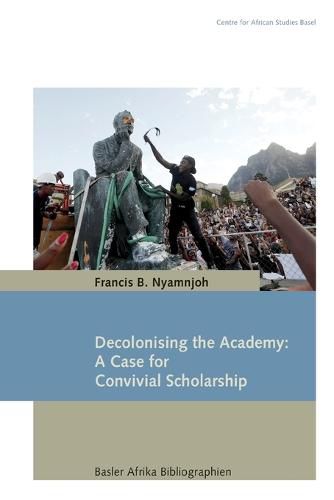Readings Newsletter
Become a Readings Member to make your shopping experience even easier.
Sign in or sign up for free!
You’re not far away from qualifying for FREE standard shipping within Australia
You’ve qualified for FREE standard shipping within Australia
The cart is loading…






This title is printed to order. This book may have been self-published. If so, we cannot guarantee the quality of the content. In the main most books will have gone through the editing process however some may not. We therefore suggest that you be aware of this before ordering this book. If in doubt check either the author or publisher’s details as we are unable to accept any returns unless they are faulty. Please contact us if you have any questions.
Recurrent clamours by students and academics for universities in Africa and elsewhere, to imbibe and exude a spirit of inclusion are a continual reminder that universities can and need to be much more convivial. Processes of knowledge production that champion delusions of superiority and zero-sum games of absolute winners and losers are elitist and un-convivial. Academic disciplines tend to encourage introversion and emphasise exclusionary fundamentalisms of heartlands rather than highlight inclusionary overtures of borderlands. Frequenting crossroads and engaging in frontier conversations are frowned upon, if not prohibited. The scarcity of conviviality in universities, within and between disciplines, and among scholars results in highly biased knowledge processes. The production and consumption of knowledge are socially and politically mediated by webs of humanity, hierarchies of power, and instances of human agency. Given the resilience of colonial education throughout Africa and among Africans, endogenous traditions of knowledge are barely recognised and grossly underrepresented. What does conviviality in knowledge production entail? It involves conversing and collaborating across disciplines and organisations and integrating epistemologies informed by popular universes and ideas of reality. Convivial scholarship is predicated upon recognising and providing for incompleteness - in persons, disciplines, and traditions of knowing and knowledge making.
$9.00 standard shipping within Australia
FREE standard shipping within Australia for orders over $100.00
Express & International shipping calculated at checkout
This title is printed to order. This book may have been self-published. If so, we cannot guarantee the quality of the content. In the main most books will have gone through the editing process however some may not. We therefore suggest that you be aware of this before ordering this book. If in doubt check either the author or publisher’s details as we are unable to accept any returns unless they are faulty. Please contact us if you have any questions.
Recurrent clamours by students and academics for universities in Africa and elsewhere, to imbibe and exude a spirit of inclusion are a continual reminder that universities can and need to be much more convivial. Processes of knowledge production that champion delusions of superiority and zero-sum games of absolute winners and losers are elitist and un-convivial. Academic disciplines tend to encourage introversion and emphasise exclusionary fundamentalisms of heartlands rather than highlight inclusionary overtures of borderlands. Frequenting crossroads and engaging in frontier conversations are frowned upon, if not prohibited. The scarcity of conviviality in universities, within and between disciplines, and among scholars results in highly biased knowledge processes. The production and consumption of knowledge are socially and politically mediated by webs of humanity, hierarchies of power, and instances of human agency. Given the resilience of colonial education throughout Africa and among Africans, endogenous traditions of knowledge are barely recognised and grossly underrepresented. What does conviviality in knowledge production entail? It involves conversing and collaborating across disciplines and organisations and integrating epistemologies informed by popular universes and ideas of reality. Convivial scholarship is predicated upon recognising and providing for incompleteness - in persons, disciplines, and traditions of knowing and knowledge making.